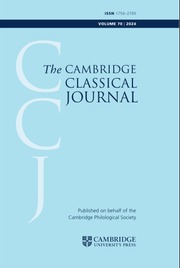Article contents
THE HIPPIAS MINOR AND THE TRADITIONS OF HOMERIC CRITICISM
Published online by Cambridge University Press: 19 May 2016
Abstract
Homer plays an important role in the discussion in the Hippias Minor of voluntary and involuntary action and their relation to knowledge and goodness. This paper argues that the Hippias Minor sheds light on the Homeric criticism of the late fifth and early fourth centuries, and that it looks forward to, and significantly influenced, the tradition of Hellenistic and later Homeric criticism, for which our best witnesses are the Homeric scholia. This article considers Socrates' presentation of Achilles and Odysseus in the Hippias Minor and makes the case, more strongly than it has been made before, that this dialogue was an important influence on the later critical tradition.
- Type
- Research Article
- Information
- Copyright
- Copyright © The Author(s) 2016. Published by Cambridge University Press
References
Works Cited
- 1
- Cited by


